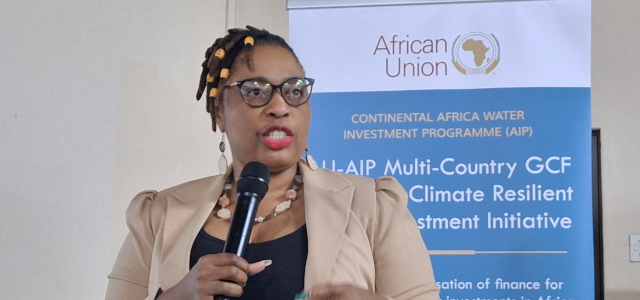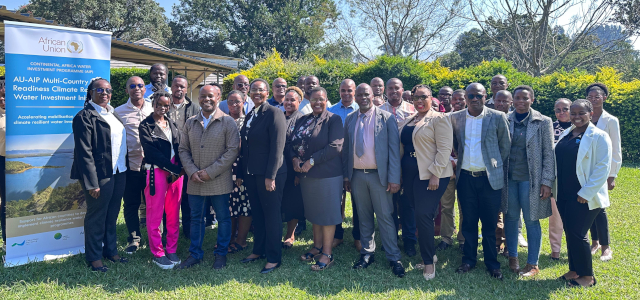Held at the Sibane Sami Hotel in Ezulwini, the workshop brought together a diverse group of stakeholders from potential Executing Entities (EEs), including policy officers, river basin authorities, global partners, and development experts engaged in Eswatini’s water security. During the session, participants successfully assessed and addressed capacity gaps in mobilising climate finance for the water sector.
The workshop builds on Eswatini's participation in the AU Multi-Country GCF Readiness Support Project and aligns closely with the nation’s Programme of Action (PoA) for 2024–2029, a response to national dialogues that emphasized water security and climate adaptation.
Delivering the keynote address, the Under Secretary-Technical and representative of the Principal Secretary of the Ministry of Natural Resources and Energy, Ms. Gabsile Mabuza, underscored the urgent need for coordinated action and innovation.
“Water is life, and yet too many communities across our country remain vulnerable to scarcity, pollution, and climate-induced disruptions. Our rural communities, where 70% of households experience drought-related hardship, cannot afford delays. Through this workshop, we must prioritise transformational interventions and unlock both human and financial capital to realise our vision of water security for all,” she explained.
Ms. Mabuza also praised the role of the African Union and international partners for their catalytic support and emphasized Eswatini’s readiness to take a leadership role in climate-resilient water investments at the continental level.
Ms. Gabsile Mabuza, Under Secretary-Technical under the Ministry of Natural Resources and Energy delivering the keynote address on behalf of the PS
The workshop featured several key components, including presentations on Eswatini’s water investment gaps, estimated at $3 billion USD, alongside plans for blended financing and the importance of the AU-AIP Multi-Country GCF Readiness Project for the Water Partnership in Eswatini. Making a presentation during the meeting, the Country Water Partnership Coordinator, Ms. Sindy Mthimkhulu, emphasized the need for coordinated stakeholder engagement and capacity enhancement to develop bankable, climate-resilient water projects. She highlighted how the AIP framework provides a strategic pathway for aligning national priorities with continental climate action goals, ultimately enabling Eswatini to access and manage climate finance more effectively.
“As the Water Partnership of Eswatini, our strength lies in a multi-stakeholder approach that fosters inclusive planning, strengthens capacity, and enables co-created, sustainable solutions. This project enhances stakeholder engagement and promotes climate-resilient, gender-responsive goals through systematic thinking and integrated water governance,” she said.

Ms. Sindy Mthimkhulu, GWP Eswatini Coordinator
The AU-AIP Multicountry GCF Readiness Project is designed to empower fifteen African countries including Eswatini by enhancing their capacity to access climate finance and implement bankable, sustainable water projects. Eswatini’s inclusion in this initiative reflects the country’s commitment to improving water security and resilience against climate change. It promotes integrated investment approaches that intersect water, energy, food, and ecosystem, while also advancing gender-transformative practices.
The discussion session allowed participants to engage directly in mapping institutional needs and formulating a capacity development roadmap. Some submissions from stakeholders indicated the need for clearer institutional mandates, improved technical capacity within implementing agencies, enhanced coordination among water sector actors, and simplified processes for accessing climate finance. These insights will guide the development of a structured capacity-building programme aimed at strengthening Eswatini’s readiness to mobilise and manage climate finance effectively.
